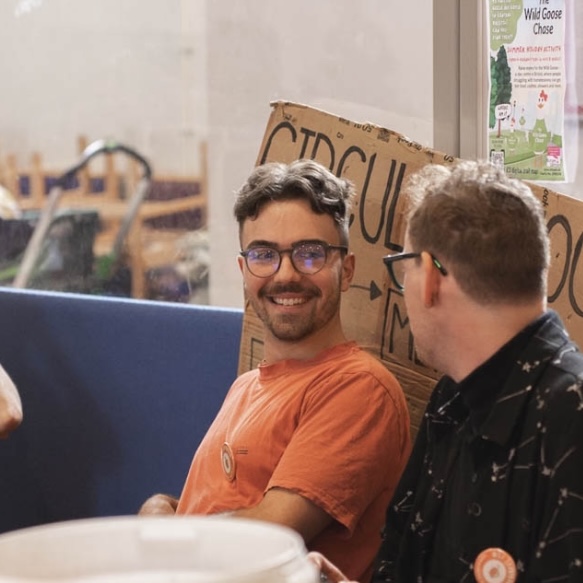Soil: The Unsung Hero Beneath Our Feet
- Alex Montgomery
- Nov 20, 2024
- 3 min read
Updated: Dec 26, 2025
Soil has a branding problem.
As a child, it was something to scrub off school trousers. Something messy. Something to avoid bringing indoors. Yet those muddy afternoons probably did more for my immune system than we realised at the time.
What most of us were never taught is that soil is not dirt.
It is alive.
And without it, none of this works.

Soil Is the Foundation of All Life
Soil is the thin, living skin of the Earth where rock, water, air, and biology meet. It is an intricate system made up of minerals, organic matter, gases, liquids, fungi, bacteria, protozoa, insects, worms, and plant roots, all working together.
A single teaspoon of healthy soil contains more microorganisms than there are people on the planet.
These organisms:
Cycle nutrients
Build soil structure
Regulate water
Store carbon
Feed plants
Without healthy soil, food systems collapse. Ecosystems unravel. Climate instability accelerates.
This is why around 95 percent of the food we eat depends on soil, directly or indirectly, a fact explored further in The Unknown Impact of Soil Health on Wellbeing

The Living World Beneath Our Feet
Earthworms often get the attention, and rightly so, but they are only one part of a vast underground network.
Fungal mycelium forms living highways between plant roots. Bacteria unlock minerals. Protozoa regulate microbial populations. Together, they form what scientists call the soil food web.
When this web is intact, soil:
Holds water like a sponge
Resists erosion
Grows nutrient-dense food
Supports biodiversity above ground
When it’s broken, soil becomes compacted, lifeless, and dependent on chemical inputs.
This distinction between living and degraded soil sits at the heart of What Generation Soil Does: Turning Food Waste into Living Soil.
The Urban Disconnect from Soil
In cities, our relationship with soil has largely disappeared.
Concrete, tarmac, and sealed surfaces dominate. Food arrives packaged and detached from place. Waste leaves quietly in bins. Soil becomes invisible.
Globally, over half of the world’s soils are now classified as degraded. This affects food security, biodiversity, water systems, and climate resilience.
Reconnecting with soil isn’t just about gardening.
It’s about rebuilding relationships with the systems that keep us alive.
This is why circular, local approaches matter, as explored in What Is Circular Food? How Bristol Is Closing the Loop
Five Simple Ways to Improve Soil Health
You don’t need a farm to support living soil. Small, everyday choices make a difference.
1. Stop Using Artificial Fertilisers
Synthetic fertilisers feed plants directly but starve soil life. Over time, they degrade soil structure and microbial diversity.
Organic inputs like compost feed the soil first, letting biology do the rest.
This principle underpins The Food Waste Hierarchy: Turning Waste into Soil and Community
2. Avoid Chemical Pesticides
Pesticides don’t discriminate. They harm beneficial organisms as much as pests, destabilising soil ecosystems.
Alternatives like companion planting, biological controls, and diverse planting work with nature rather than against it.
3. Try No-Dig Gardening
Digging disrupts fungal networks and soil structure.
No-dig methods build fertility from the surface down, allowing microbes and worms to do the work naturally.
This mirrors how healthy soils function in nature.
Four. Turn Food Waste into Compost
Food waste isn’t waste.
When composted properly, it becomes food for soil life. Compost improves structure, nutrient availability, and water retention.
For urban homes, Bokashi fermentation is one of the easiest ways to start, explained in What Is Bokashi? How Microbes Transform Food Waste into Soil
If composting at home isn’t practical, community systems fill the gap.
Five. Use Natural Soil Enhancers
Mulch, biochar, worm castings, and mineral-rich amendments all support soil biology.
The goal isn’t to force growth, but to create conditions where life thrives.
This philosophy is central to the Bristol Living Compost Project, where food waste is returned to soil locally
Soil, Sustainability, and the Future
Healthy soil is one of our most powerful climate tools.
It:
Stores carbon
Buffers floods and droughts
Supports resilient food systems
Underpins biodiversity
Yet soil protection rarely makes headlines.
This is why decentralised, community-led projects matter. They turn abstract environmental problems into tangible, local action.
At Generation Soil, soil health sits at the centre of our workshops, composting systems, and food-growing projects, all rooted in Food Waste & Circular Systems

A Quiet Conclusion
Soil doesn’t shout for attention.
It works slowly. Quietly. Reliably.
Beneath our feet, it feeds us, filters water, stores carbon, and holds ecosystems together.
When we care for soil, we care for everything else by default.
Start small. Compost one bucket. Plant one seed. Pay attention.
The world beneath your feet will respond.




Comments